Past Speakers
2024 — Director for the Centers for Disease Control and Prevention Dr. Mandy K. Cohen (remarks)
2023 — Visionary and founder of Recovery Café and the Recovery Café Network Kathy Killian Noe (remarks)
2022 — CNN host and Dream Corps founder Van Jones (remarks)
2021 — Former Secretary of State Condoleezza Rice (remarks); Secretary of Transportation Pete Buttigieg (remarks); NFL wide receiver Kendall Hinton (remarks) (Note: All remarks delivered virtually during the pandemic)
2020 (in person) — Retired President of Wake Forest Nathan Hatch (remarks)
2020 (virtual) — Entertainers Tina Fey, Carson Daly, Jon Stewart, Tracy Morgan, Jimmy Kimmel; NBA player Chris Paul (video)
2019 — Washington Post Publisher Fred Ryan (remarks)
2018 — Vice Chairman, Managing Director and Senior Client Advisor at Morgan Stanley Carla Harris (remarks)
2017—Pulitzer Prize-winning author and presidential historian Jon Meacham (remarks)
2016 — Founder and president of Interfaith Youth Core Eboo Patel (remarks)
2015 — Comedian and late-night TV host Stephen Colbert (remarks)
2014 — Former Executive Editor of The New York Times Jill Abramson (remarks)
2013 — Managing Editor of “Washington Week” and Senior Correspondent for the “PBS NewsHour” Gwen Ifill (remarks)
2012 — Chairman of DISH Network Charlie Ergen (remarks)
2011 — PepsiCo CEO Indra K. Nooyi (remarks)
2010 — American Express CEO Kenneth Chenault (remarks)
2009 — Vice President Joe Biden (remarks)
2008 — Washington Post columnist E.J. Dionne Jr. (remarks)
2007 — New York Times columnist David Brooks (remarks)
2006 — Former Virginia Governor Mark Warner (remarks)
2005 — Professional Golfer Arnold Palmer (’51) (remarks)
2004 — Secretary of State Colin Powell (remarks)
2003 — New York City Mayor Michael Bloomberg (remarks)
2002 — U.S. Senator John McCain (remarks)
2001 — Former First Lady Barbara Bush (remarks)
2000 — Cisco CEO John Chambers (remarks)
1999 — Cardinal Francis Arinze
1998 — White House Chief of Staff Erskine Bowles (remarks)
1997 — IBM CEO Lou Gerstner (remarks)
1996 — U.S. Senator Sam Nunn (remarks)
1995 — CNN News Anchor Judy Woodruff
1994 — Former Congressman Jack Kemp
1993 — Notre Dame President Emeritus Theodore Hesburgh
1992 — Novelist Tom Clancy
1991 — Virginia Governor Doug Wilder
1990 — Millard Fuller, Founder, Habitat for Humanity International
1989 — Benjamin Bradlee, Executive Editor, The Washington Post
1988 — PepsiCo CEO Wayne Calloway (’59)
1987 — North Carolina Governor James G. Martin
1986 — Doonesbury cartoonist Garry Trudeau
1985 — Reynolds Professor and Poet Maya Angelou
1984 — Bill Moyers, CBS News, Senior News Analyst
1983 — John William Gilbert, Member, British Parliament
1982 — Harris Llewellyn Wofford, Retired President, Bryn Mawr College
1981 — William Hampton Wagoner (’49), Chancellor, UNC-Wilmington
1980 — Merrimon Cuninggim, Retired president, Salem College
1979 — Peter Jay, British Ambassador to the United States
1978 — Shearon Harris (’36, JD ’38), Chairman, Carolina Power & Light Company
1977 — U.S. Representative Frank Thompson
1976 — Harry M. Philpott, President, Auburn University
1975 — U.S. Representative Barbara Jordan (D-Texas)
1974 — Alvin M. Weinberg, Director, Office of Energy Research and Development, and Former Director, Oak Ridge National Laboratory
1973 — Wallace Carroll, Publisher, Winston-Salem Journal and Sentinel
1972 — U.S. Representative Gerald R. Ford (R-Mich.)
1971 — Robert E.R. Huntley, President, Washington and Lee
1970 — Bill Moyers, Former Publisher, Newsday
1969 — President James Ralph Scales
1968 — J. Ollie Edmunds, Chancellor, Stetson University
1967 — Retiring President Harold W. Tribble
1966 — Vittorio Giannini, President, N.C. School of the Arts
1965 — Former N.C. Governor Terry Sanford
1964 — Edgar F. Shannon, President, University of Virginia
1963 — Luther H. Hodges, N.C. Secretary of Commerce
1962 — Liston Pope, Dean of the Divinity School, Yale University
1961 — Josef Nordenhaug, General Secretary, Baptist World Alliance
1960 — Lam Chi-Fung, President, Hong Kong Baptist College
1959 — Frances P. Gaines, President, Washington and Lee College and former president, Wake Forest College (1927-1930)
1958 — Kenneth I. Brown, Executive Director, Danforth Foundation
1957 — Gordon Gray, Director, Office of Defense Mobilization
1956 — Dr. Hubert Poteat, Professor of Latin and Romance Civilization
1955 — Gilbert T. Stephenson, Pendleton attorney
1954 — Rev. J. Clyde Turner, pastor, First Baptist Church, Greensboro
1953 — John S. Battle, Governor of Virginia
1952 — Robert P. Holding, President, First Citizens Bank and Trust Company, Smithfield
1951 — Colgate W. Darden, President, University of Virginia
1950 — Dr. Sankey Lee Blanton, Dean, School of Religion, Wake Forest College
1949 — Robert Lee Humber, founder, United World Federalists, Greenville
1948 — Dr. Kenneth Scott Latourette, professor of missions and Oriental history, Yale University
1947 — Dr. Theodore F. Adams, pastor, First Baptist Church, Richmond, Va.
1946 — Rev. George A. Buttrick, pastor, Madison Avenue Presbyterian Church, New York City
1945 — Dr. Sankey Lee Blanton, pastor, First Baptist Church, Wilmington
1944 — Gerald W. Johnson, Baltimore journalist and essayist
1943 — Emery B. Denny, associate justice, North Carolina Supreme Court
1942 — Julian Miller
1941 — J.W. Bailey, N.C. senator
1940 — F.P. Graham, president, University of North Carolina
1939 — S.C. Garrison, president, Peabody College
1938 — J.M. Broughton, N.C. senator
1937 — O.W. Henderson
1936 — George F. Zook, head of American Council on Education
1935 — Josephus Daniels, U.S. ambassador to Mexico
1934 — E.W. Sikes, president of Clemson College
1933 — Douglas S. Freeman, journalist and historian
1932 — W.E. Dodd, professor, University of Chicago
1931 — W.G. Brogdon
1930 — Clarence A. Barbour, president of Brown University
1929 — E.W. Sikes, president of Clemson College
1928 — J.C. Metcalf
1927 — J.H. Finley
1926 — Walter Lippmann, writer and political commentator
1925 — Joseph Fort Newton, Baptist minister and masonic author
1924 — Charles E. Jefferson, pastor, Broadway Tabernacle, Brooklyn, N.Y.
1923 — John Erskine, writer and professor, Columbia College
1922 — George William Coleman, president, Babson Institute
1921 — Josephus Daniels, editor, Raleigh News & Observer
1920 — A.C. Dixon, pastor, Metropolitan Tabernacle, London
1919 — J.H. Randall
1918 — E.Y. Webb, N.C. representative
1917 — Henry C. King, president, Oberlin College
1916 — O.P. Gifford, pastor, Delaware Avenue Baptist Church, Buffalo, N.Y.
1915 — Cornelius Woelfkin, pastor, Park Avenue Baptist Church, New York
1914 — Simeon E. Baldwin, governor of Connecticut
1913 — Hugh Black, author, chair of Practical Theology, Union Theological Seminary
1912 — Newell Dwight Hillis, pastor, Plymouth Church of the Pilgrims, Brooklyn, N.Y.
1911 — Harry Emerson Fosdick, pastor, First Baptist Church, Montclair, N.J.
1910 — G.W. Truett, pastor, First Baptist Church, Dallas
1909 — J.C. Kilgo, president, Trinity College
1908 — R.W. Taylor, N.C. Senator
1907 — Ira Remsen, president, Johns Hopkins University
1906 — Bliss Perry, editor, Atlantic Monthly
1905 — B.D. Gray, secretary, Home Mission Board
1904 — C.S. Gardner, professor of sociology and homiletics, Southern Baptist Theological Seminary
1903 — R.P. Johnson, Baptist minister from New York
1902 — Shailer Matthews, professor, University of Chicago
1901 — Tom Dixon Jr., lecturer
1900 — A.W. Small, professor, University of Chicago
1899 — W.P. Trent, president, University of the South
1898 — E.B. Andrews, president, Brown University
1897 — M.W. Ransom, N.C. senator
1896 — B.H. Carroll, pastor
1895 — T.W. Mason, N.C. Railroad Commission
1894 — F.C. McConnell, pastor
1893 — J.C. Hiden, pastor, Richmond, Va.
1892 — Six alumni: J.C. Scarborough, C.M. Cooke, J.D. Hufham, T.H. Pritchard, E.E. Hilliard, G.W. Sanderlin
1891 — H.W. Battle, pastor
1890 — Tom Dixon Jr., pastor, Dudley Street Church, Boston
1889 — William L. Wilson, U.S. representative, West Virginia
1888 — Z.B. Vance, U.S. Senator, N.C.
1887 — M.W. Ransom, N.C. senator
1886 — W.E. Hatcher, pastor
1885 — R.F. Armfield, N.C. representative
1884 — Jesse B. Thomas, Baptist minister and teacher
1883 — Henry McDonald
1882 — Charles F. Deems, pastor, Mercer Street Presbyterian Church, New York
1881 — J.B. Hawthorne, pastor, Atlanta
1880 — Dr. David R. Wallace, psychiatrist
1879 — M.W. Ransom, N.C. senator
1878 — Henry McDonald, pastor, Richmond and Atlanta
1877 — D.G. Fowle, N.C. attorney general
1876 — W.M. Robbins, N.C. representative (not able to be present, address read)
1875 — A.M. Waddell, N.C. representative
1874 — Seaton Gales, editor, Raleigh Register
1873 — A.S. Merrimon, N.C. senator
1872 — Z.B. Vance, former governor of N.C.
1871 — J.L.M. Curry, professor, Richmond College
1870 — John Kerr, judge
1869 — J.C. Hiden, pastor, Wilmington Baptist Church
1868 — L.P. Olds, lawyer and politician
2018: CARLA HARRIS
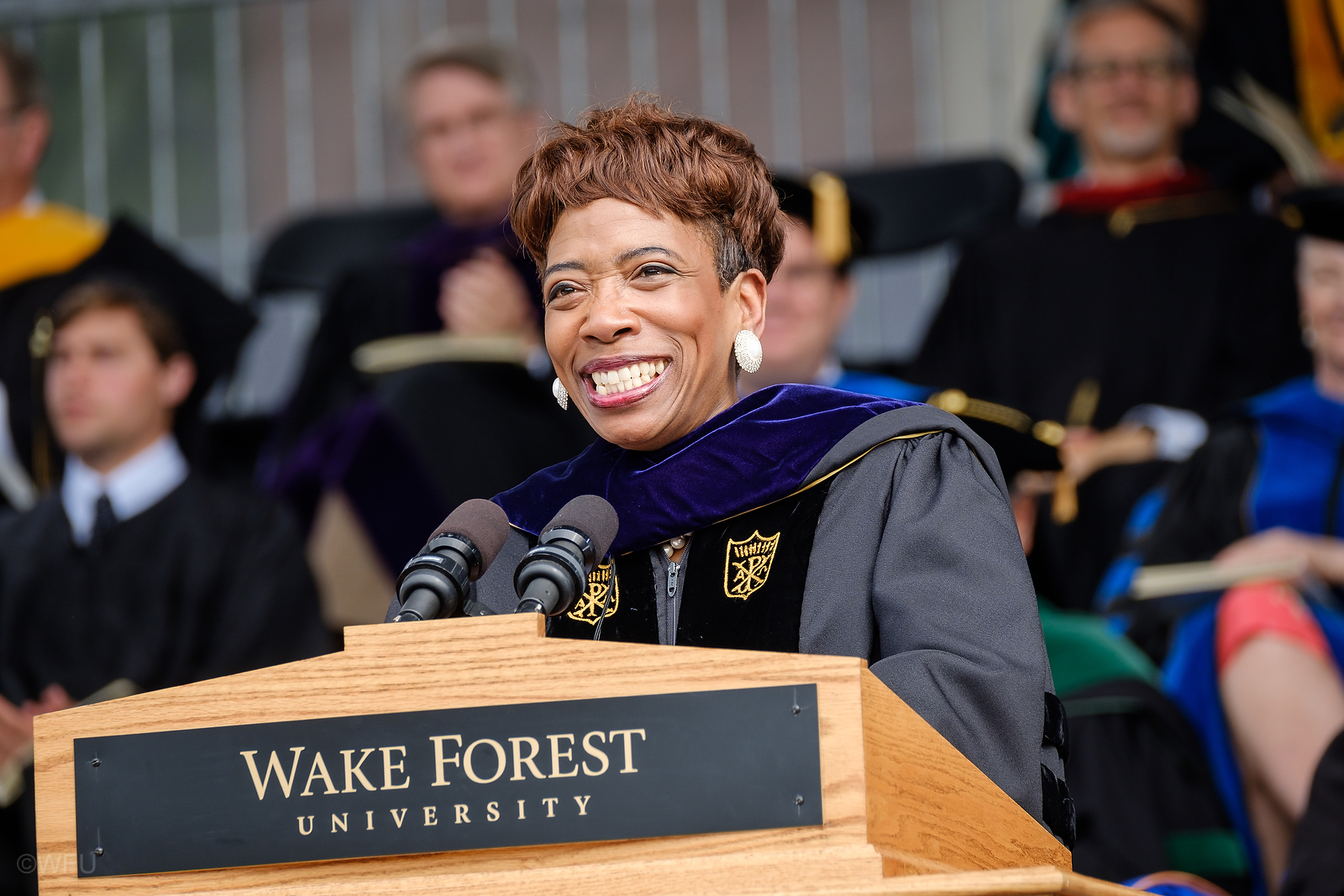
2015: STEPHEN COLBERT
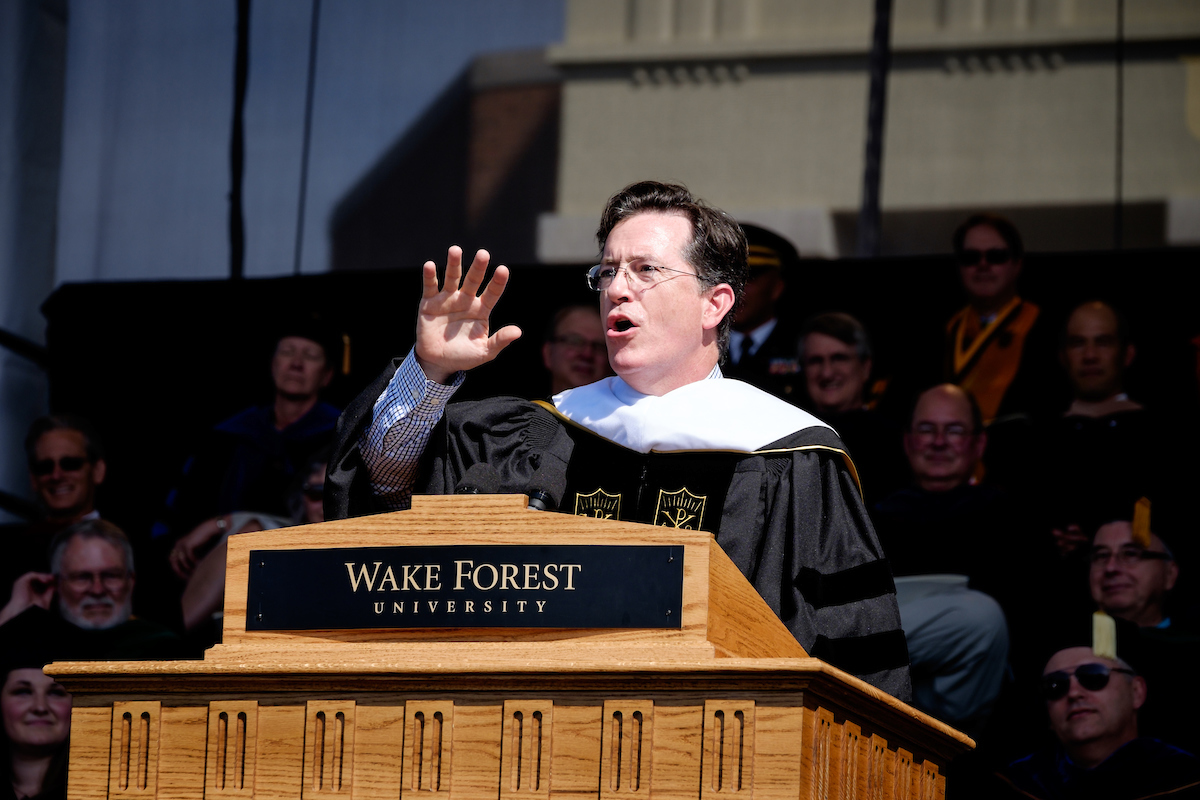
2009: JOE BIDEN
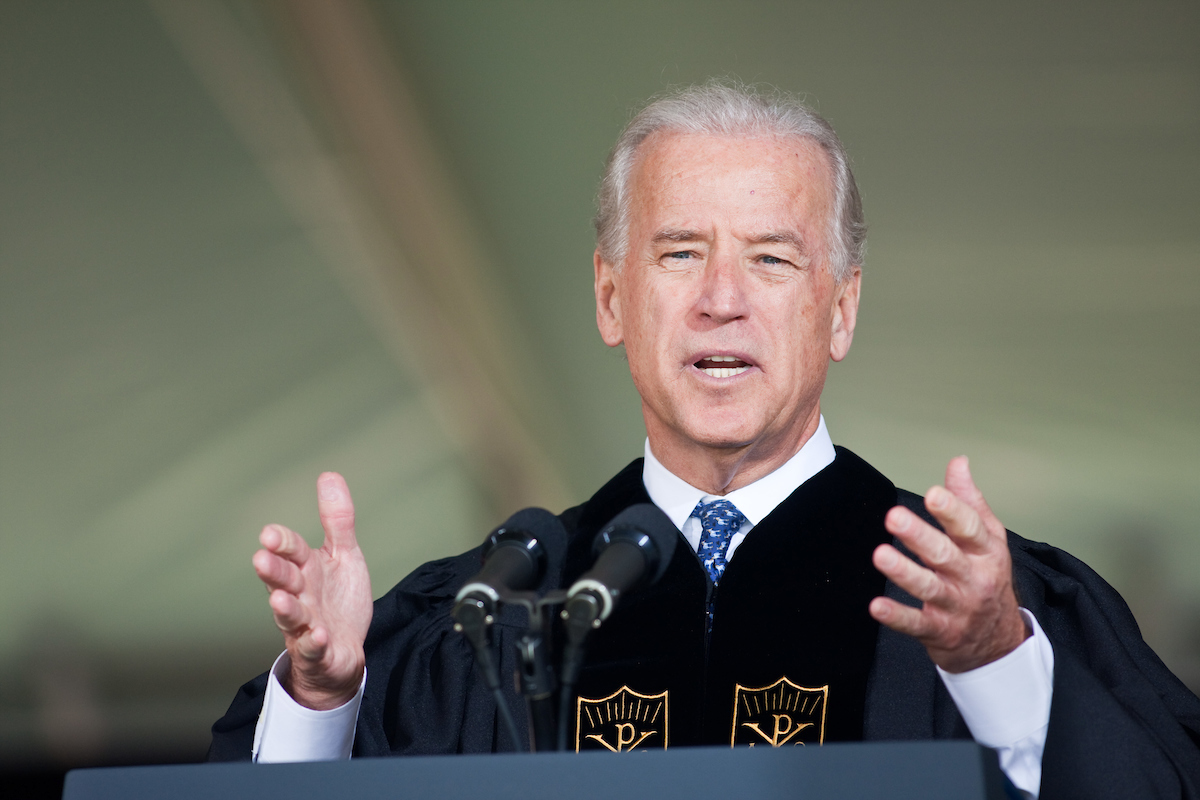
2005: ARNOLD PALMER (’51)
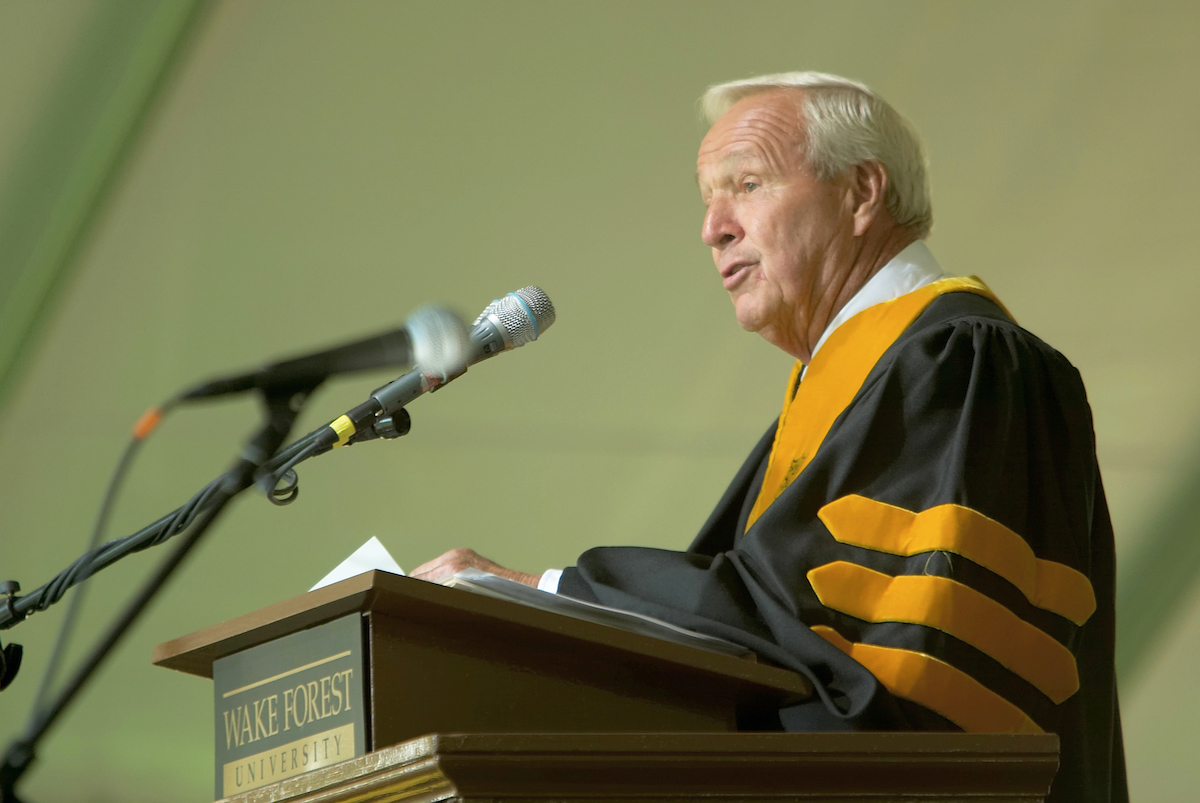
2004: COLIN POWELL
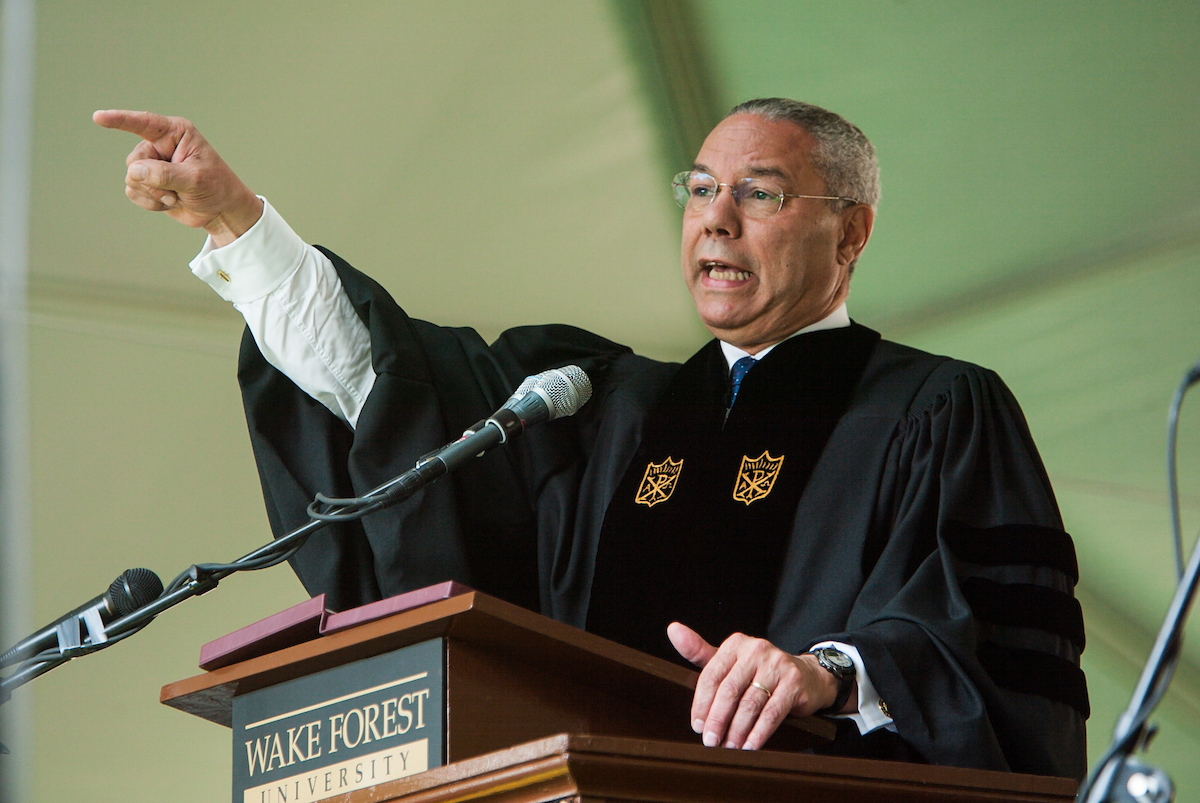
“Party on, Demon Deacons, party on.”
2001: BARBARA BUSH
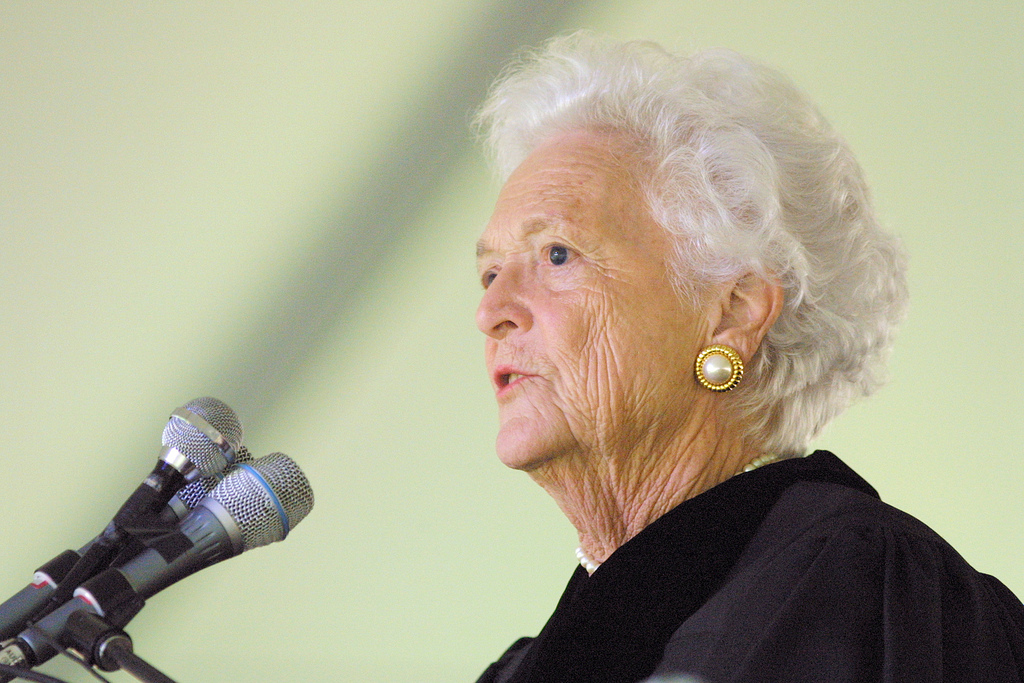
1997: LOUIS V. GERSTNER JR.
“Computers are magnificent tools for the realization of our dreams, but they will never replace the dreamers.”
1990: MILLARD D. FULLER
“The great disparity between the rich and the poor raises tremendously important ethical and moral questions for all people of concern and compassion.”
1984: BILL MOYERS
“Sometimes I think that Americans know everything there is to know about the last 24 hours and nothing about the last 60 years or the last 60 centuries.”
1975: BARBARA JORDAN
“The transition from dreams and rhetoric to fact is not an easy one. The path is fraught with travail.”
1965: TERRY SANFORD
“We need to be teaching that communism won’t stand the light of day or the light of truth. Our best weapon is the truth.”
1963: LUTHER HODGES
“We are moving swiftly into an age of scientific and technological transformation which could overwhelm many of our traditional human values.”
1956: DR. HUBERT POTEAT
“This college has always preached and lived a joyous hospitality to the truth, no matter from what source it comes, an uncompromising refusal to form final judgment until all the evidence is in, and a steadfast willingness to accord to others the unfettered right to their opinions, no matter how widely they may differ from our own.”
1941: JOSIAH WILLIAM BAILEY (1893)
“The people of the nation do not make war, but defend they will to the utmost against all, from within or without, who would invade their land or their rights…”
